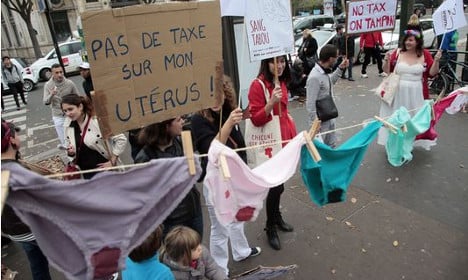Protesters joined the rally in central Paris, brandishing colourful flags and banners reading: “No tax on my uterus,” “Each time I bleed, the State wins,” and “let us bleed without over-charging us”.
One feminist group at the protest hung pairs of women's underwear soiled with fake menstrual blood from a clothes line.
“What is not right is that at a time when women are underpaid, when they are more likely to be unemployed, when they are paid less than men, each month, they have to pay a tax on their uterus: the tampon tax,” Ophelie Latil, who founded the French feminist collective Georgette Sand, told AFP.
Georgette Sand called for the protest after France's National Assembly last month rejected an amendment to reduce the VAT on tampons and other feminine sanitary products to 5.5 percent from the current rate of 20 percent.
The amendment was rejected after the government said changing the tax would cost €55 million ($60 million).
Beau succès de la Mobilisation #taxetampon @Georgette_Sand à Chatelet ! #notaxtampon pic.twitter.com/50i5lVHOPE
— Julien Bayou (@julienbayou) November 11, 2015
Georgette Sand countered by saying that such a tax amounted to overcharging women for what is a “basic need”, estimating a woman will spend €1,500 ($1,600) in her lifetime on sanitary products.
The Senate is expected to discuss a new amendment on the issue on November 19.
Worldwide anger
The protest is the latest in a growing international movement of anger against what has become known as the “tampon tax”.
Online petitions have collected hundreds of thousands of signatures in Britain, France, Australia and elsewhere calling for a tax reduction on feminine hygiene products. Canada has already scrapped the tax.
Taxe tampon : «Laissez-nous saigner sans nous surtaxer» https://t.co/p4dO4UbhOC
— LACHEVRE Guillaume (@LACHEVRGUILLAUM) November 12, 2015
In Britain a government decision a few weeks ago not to scrap the five percent tax on sanitary products, with lawmakers arguing they were a “non-essential, luxury” item, sparked an uproar on social media.
Women posted pictures of tampons in champagne glasses and jewellery boxes under the #tampontax hashtag on Twitter and Facebook, while men also joined the chorus of disapproval.
In France, the #laissermoisaigner (let me bleed) and #taxetampon have been trending on Twitter.
Earlier this month another French protest called “Culotte Gate” (panty gate) saw women post hundreds of panties stained with fake blood to French President Francois Hollande and other members of government.
Elle envoie des culottes tachées de sang aux politiques contre la taxe tampon https://t.co/a7FXHaBrBY pic.twitter.com/iYj7j3gjHN
— Marc Dorcel (@dorcel) November 6, 2015
At the French protest, Axel Cassin, who was dressed in a Santa Claus suit and holding a sign that said “less taxes in our chimneys”, said men should support women in their fight.
He highlighted one French lawmaker's argument that equated women's sanitary products with men's shaving creams.
“A man can choose to shave or not to shave,” Cassin said. “A woman on the other hand cannot choose whether or not to have her period.”




 Please whitelist us to continue reading.
Please whitelist us to continue reading.
Member comments